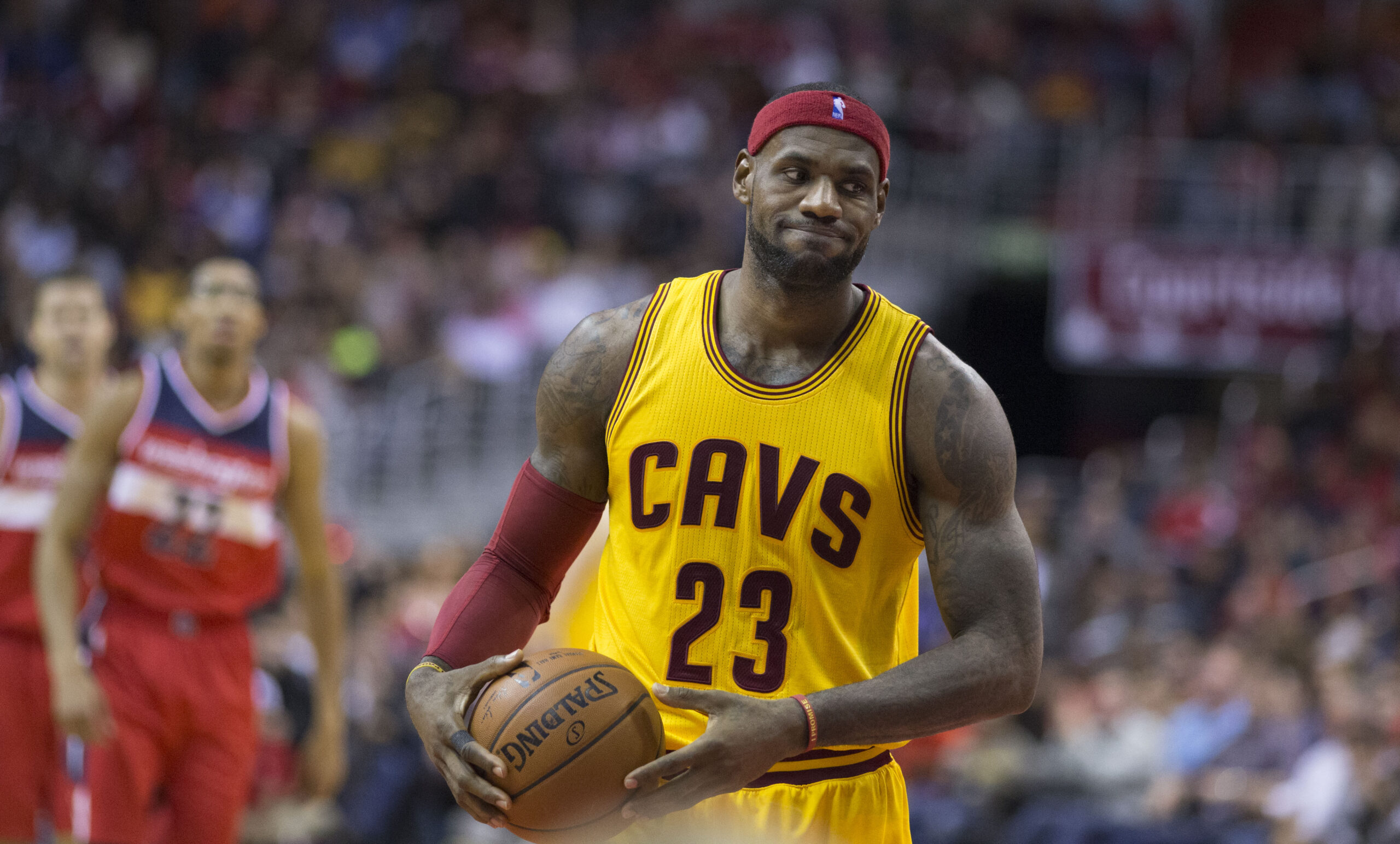With 8:29 left in the third quarter of last Tuesday night’s game against the Oklahoma City Thunder, LeBron James canned a catch-and-shoot triple. The next possession, James grabbed the rebound and dribbled into a pull-up three. A few minutes later, he deflected a pass and, in vintage LeBron fashion, squeezed by defenders for a transition layup, pulling him within five points of Kareem Abdul-Jabbar’s all-time points record.
The sequence encapsulated the evolution of James’ game. Entering the league as a high-flying superathlete, James sustained his offensive output late in his career by polishing his jump shot, mastering his utilization of strength, and sharpening his ability to read defensive coverages, all of which he displayed against the Thunder.
The NBA’s all-time points record—set by Abdul-Jabbar in 1984—stood at 38,387 points until Tuesday night, when a fadeaway jump shot from the elbow at the end of the third quarter elevated James to the top spot.
For a long time, Abdul-Jabbar’s record seemed unbreakable. After surpassing Wilt Chamberlain’s total of 31,419 points, Abdul-Jabbar claimed the all-time scoring record and then went on to play five more seasons in the NBA. By the end of his career, he had padded his record by an additional almost seven thousand points. The only other player to come within 4,000 points of Abdul-Jabbar’s record before James’ surge was Karl Malone, who retired in 2004.
The improbable nature of James breaking the scoring record begs the question of when—if ever—James’ point total will be surpassed. A number of recently retired players—NBA legends Kobe Bryant, Dirk Nowitzki, and Tim Duncan—climbed up the scoring leaderboard late in their careers, but failed to break into Abdul-Jabbar’s territory due to declines in scoring well before James’ current age of 38.
James’ longevity and durability are exactly what enabled him to top a record that seemed untouchable. His commitment to his body and health is well-documented. James reportedly spends seven figures annually caring for his body, a budget that includes trainers, chefs, masseuses, and outfitting his personal gym with high-tech equipment. Recovery regimens of hydration, electrostimulation, and ice baths helped James withstand the physical stress of repeated playoff runs and avoid long-term injury.
Increases in three-point shooting and teams embracing modern offensive philosophies have enabled more high-volume scoring, making it seem more feasible that a player whose career starts in the modern era could put James’ record in jeopardy. Evaluating the career arcs of today’s superstars who have molded their offensive games around three-point shooting, however, challenges that notion, illustrating the difficulty of matching James’ offensive output in any era.
Stephen Curry, for example, the all-time leader in threes made, consistently generates more efficient scoring seasons than James, but stands almost no chance of passing his points total. Whereas James entered the league as his team’s leading scorer, averaging almost 21 points per game as a rookie, Curry was forced to share ball-handling and scoring responsibilities early in his career and thus failed to reach the 20 points per game threshold until his fourth season. James quickly ascended to the 30 points per game threshold by his third season, while it took Curry until his seventh season to do so.
Besides having to share the scoring load with other stars, injuries derailed Curry’s chances at the scoring record. Even if Curry were to sustain his current level of production for the coming years, James’ record would remain beyond his reach. Averaging 30 points per game for the next five full seasons still leaves Curry almost five thousand points short of the current record, illustrating the miniscule room for error James’ point total affords.
James Harden is the best illustration of how modern offensive principles enable explosive scoring numbers, although his career numbers still fall short of James’. In his tenth and eleventh seasons, Harden averaged just over 34 and 36 points per game, respectively, a byproduct of the Rockets building their entire offense around his pick-and-roll and isolation play. However, despite posting the highest single season scoring averages since Michael Jordan, several factors doomed Harden’s run at the scoring record. Like Curry, it took Harden several seasons to become a high-volume scorer, stuck behind Kevin Durant and Russell Westbrook in Oklahoma City’s pecking order. Harden has remained fairly durable throughout his career, but after a hamstring injury in 2021, a loss of explosion and speed forced him to reinvent his game, evolving into more of a pass-first point guard.
The natural decline in Harden’s scoring further contextualizes the absurdity of James’ career arc. Although he has missed more time with the Lakers due to injuries, James’ single season scoring average has never dipped below 25 points per game, and at 37 years old, he surpassed 30 points per game for the first time since his fifth season. In 2023, James is on pace to average north of 30 points per game again, a figure that would easily break the record for the highest scoring average achieved by a 38-year-old.
Durant, currently fourteenth on the all-time scoring list, probably poses the greatest threat to James’ record. Like James, Durant started posting scoring averages above 20 as a 19-year-old, and he led the league in total points five straight seasons early in his career. However, an achilles tear took Durant out for the entirety of his thirteenth season, leaving him with considerable ground to make up relative to James, who remarkably missed only five percent of his team’s total games in the first 15 years of his career. Passing James requires Durant to sustain full seasons of scoring averages above 30 into his age 39 season, and even that may not be sufficient depending on how many additional seasons James plays.
Younger stars—such as Luka Dončić and Trae Young— benefit from entering the league when offensive efficiency across the league has peaked and coaches are leaning into heliocentric-style offenses built around one player. Both fifth-year players entered the league at 19 posting single-season scoring averages comparable to those of James’ first five seasons. Young, however, lacks the size to make up for losses in quickness as he ages, and Dončić has received criticism early in his career for not staying in shape, raising questions about his ability to commit to his health the same way that has enabled James to sustain his scoring production past the age most players retire.
What makes the prospect of passing James even more daunting is that he shows few signs of slowing down as a scorer, and his retirement doesn’t seem to be in the cards for at least another couple of seasons. “I’m not going anywhere,” James said on Jan. 31 in a press conference after a win against the Knicks. “I’m going to be in this league for at least a few more years.” James has voiced a desire to play with his eldest son, Bronny, who becomes NBA eligible in two years, when James turns 40, and even teased the idea of waiting for his 15-year-old son, Bryce, to join the league before retiring.
Overall, James’ continued scoring prowess is not just a matter of adhering to meticulous recovery regimens that help him defy the effects of aging. As James has lost some of his burst, leaping ability, and agility, he has modified his shot selection, exchanging blow-bys for off-the-dribble threes, and thunderous dunks for dexterous layups. His mastery of reading defenses and his self-awareness that losses in athleticism necessitate growth in skill-oriented parts of his game have forestalled declines in scoring.
James’ record symbolizes more than just a statistical accomplishment: it’s the most impressive feat of evolution and longevity in professional sports’ history.




